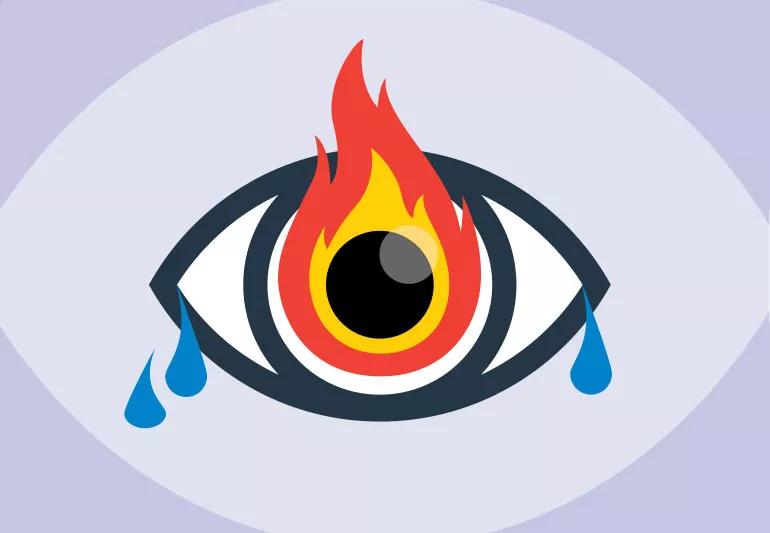Allergies aren't always the cause

Image content: This image is available to view online.
View image online (https://assets.clevelandclinic.org/transform/37482964-a5bb-4e75-b70f-4ef224ca7806/eyesFireWtr-637650398-770x553_jpg)
Eye on fire and watery Illustration
We’ve all experienced the feeling of irritated eyes, going from a burning dryness to a sudden overflow of tears. Allergies can’t always take the blame for this, especially when your eyes are irritated out of season. Optometrist Weston Tuten, OD, explains why this sensation happens, and how to find relief.
Advertisement
Cleveland Clinic is a non-profit academic medical center. Advertising on our site helps support our mission. We do not endorse non-Cleveland Clinic products or services. Policy
Eyes typically burn when they dry out. The tear film that covers the surface of the eye is comprised of three layers. The bottom, a mucous layer, helps spread tears evenly over the surface of the eye. A thick, watery layer in the middle lies beneath a thin, oily outer layer.
“The outer layer provides a barrier to evaporation of the water layer,” Dr. Tuten explains. “The oils come from the sweat glands in your eyelids that are activated by the mechanical pressure of blinking, which is why if your vision is blurry, sometimes blinking helps make it clearer. Over time, these oil glands can become clogged, and each blink produces less oil to coat the tears and make sure they don’t evaporate.”
With the evaporation of water comes the stinging, burning sensation in the eyes.
“This is a signal for your brain to send more tears, but it can only send more watery tears,” he says. “Your excessive watery tears will spill over the lid margin and run down your face.”
A natural way to increase the amount of oil tears is placing warm compresses or dry eye masks over your eyes for around five minutes, melting the solidified oils in your eyelids.
“This shuts down the reflex loop of tearing,” Dr. Tuten says. “Using artificial tears with an oil layer substitute in them is another method. These provide an extra oil barrier to your tears.”
Advertisement
Whether you wear contact lenses, glasses or no vision correction at all, dry and teary eyes is something that can affect everyone.
“Typically contact lens wear time is anywhere from 14 to 16 hours,” Dr. Tuten explains. “Different brands have different levels of oxygen they let through the cornea, so some you can wear a little longer than others. Don’t think that wearing contacts is always the cause of this sensation.”
When allergy season hits, over the counter medications and topical eye drops can help with additional symptoms of itchy and watery eyes.
If it’s been a few weeks and compresses and using artificial tears isn’t helping, it’s time to see a physician.
“A blocked tear duct could be the issue,” Dr. Tuten says. “The tear ducts run from the corner of your eye by your nose, through your nose, and out through your throat. If they get blocked, it’s just like putting a plug in a drain. The tear level will rise and eventually over flow. A visit to see a specialist to have your lacrimal drainage system probed is the answer to getting relief.”
Another possibility for this persistent irritation is an ocular surface disease stemmed from another underlying condition.
“These range anywhere from systemic inflammatory problems to rheumatologic issues,” he explains. “These require stronger, prescription strength eye drops to help combat the dryness.”
Advertisement

Delivered every Tuesday!
Sign up for our Health Essentials emails for expert guidance on nutrition, fitness, sleep, skin care and more
It's a letter about the news!

Every two weeks once
Sign up for our Health Essentials emails for expert guidance on nutrition, fitness, sleep, skin care and more.
Learn more about our editorial process.
Advertisement
From scratching your cornea and tearing your retina to introducing allergens and causing infections, pawing at your peepers just doesn’t pay off
Redness, pain and blurred vision? See your doctor now
Most recommended precautions center around minimizing bruising or swelling
Even one drink can have an impact on your cognitive function leading to slurred speech, blurred vision and impaired memory
Understand who may (and may not) benefit
Lorem ipsum dolor sit amet. Et odio Quis vel ipsam omnis eum alias deleniti et placeat impedit non voluptas galisum hic autem enim et cupiditate aliquid. Est beatae quidem non facilis autem ut commodi nisi aut tempore rerum et dolores voluptatem cum enim optio id sapiente quasi. Ad laboriosam officiis 33 cupiditate sequi ea voluptatum consectetur qui necessitatibus voluptate et quasi doloremque et facere explicabo quo explicabo officia
Type 2 diabetes isn’t inevitable with these dietary changes
Applying a hot or cold compress can help with pain
Pump up your iron intake with foods like tuna, tofu and turkey